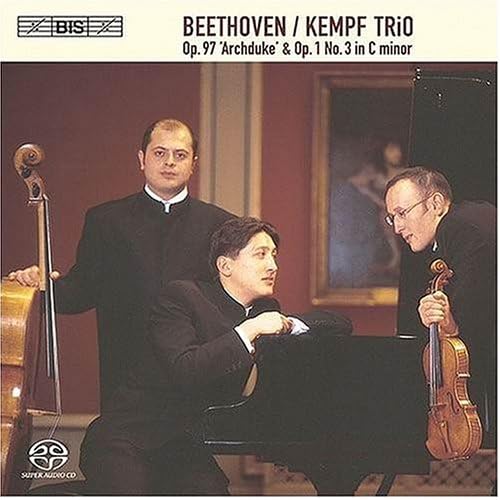Quote:
Originally Posted by wower /img/forum/go_quote.gif
The Beethoven Florestan isn't available on amazon.ca for some reason else that would be my choice.
|
The Florestan Trio's Beethoven is available at Amazon Canada, it's just listed eccentricly. Here's a
link.
To find the other volumes of the set, just locate them on Amazon, get the amazon id no. which is the "ASIN" (for vol. 1 it is B00007FKRF) and put that in the search box at amazon canada. It will bring up the
page with the recording. For some reason, Amazon Canada calls it the V1 Comp Music for Pno Trio with no mention of composer or artist.
Quote:
| I'll go with the Kempf but I must digress: why pick a period performace over a modern one? It's a factor that rarely raises to the level of consciousness with me but I know it's a serious factor for other classical music lovers. |
The question of period instrument performance vs. modern instrument performance of classical works is for me a matter of taste. I find that there are things to admire in both practices. However, I know many who don't care for one or the other and stick either with period instrument or modern instrument.
Nowadays performance on modern instruments is very much influenced by the research done by the period instrument enthusiasts: the HIP crowd. You probably won't know that in the last 20 or 30 years the performance of Beethoven has shifted radically from slower tempos designed to showcase the more romantic aspects of Beethoven's works to swifter tempos in keeping with Beethoven's metronome markings. For years it was believed that the metronome markings on Beethoven's manuscripts were incorrect because his nephew Carl van Beethoven whom he made his amanuensis, misread the metronomes of the time, putting a faster marking than the composer actually intended. Historic research has busted this myth and we now know that Beethoven's works in his lifetime were performed at far swifter tempos than had become customary during the last part of the 19th century and first parts of the 20th century. Similarly, phrasings also shifted subtly and the music became more classical sounding in performance and less romantic. The world had to learn a new expressive vocabulary for HIP Beethoven. Nowadays, period instrument performance is important because the pianos and violins of Beethoven's time had slightly different timbres as well as less dynamic range. Thus the balance between the instruments as Beethoven would have known them had changed dramatically. One shift in string playing (violins, violas, cellos, double-basses, etc) was the movement under the influence of Jascha Heifetz to a more liberal use of vibrato on these instruments and the complete absence of portamento. By the early 20th century, most string players were also shifting from the use of gut strings to the now universal steel strings for these instruments. There were numerous advantages to the use of steel: for one thing, they stayed in tune over longer stretches of time which is why musicians don't have to retune their instruments during performances as was common with gut strings. Another advantage, especially for romantic music was the increased volume and rounder timbre of the steel strings. Gut strings have a famously nasal sound, which many find jarring when played without vibrato. However, it should be noted that although Heifetz championed the almost continuous use of vibrato in his playing (and the absence of portamenti), he never adopted steel strings which is why his sound was "smaller" than other violinists of his era and his sound was sometimes criticized as "shrill" or "whiney."
So, we get back to the question of why anyone would want a period instrument recording of Beethoven, and the answer is that it sounds very, very differently from the modern instrument performance. A fortepiano sounds markedly different from a modern concert grand: sound is warmer, more muted and with less dynamic range. Thus the balance between the 3 instruments is different, and the performance has to take this into account. Nowadays musicians play pianissimos much more softly and fortissimos much more loudly than was customary in Beethoven's day. It makes the performance more varied and shaded, but it is a slight distortion of what Beethoven would have been familiar with.
For my money, if the artists are great it doesn't matter whether they use period instruments or modern instruments: a score is like the outline and detailed instructions as to colors for a great painting. The artists will have to make it their own by deciding just how vibrant the red is, or how soft the yellow. He will stretch tempos (color outside the lines) or contract them (stay well within the lines) so that each time the work sounds new and fresh. It's good to hear something that lets you understand how the composer would have heard these works, but it's also good to know how their performance practices have evolved over time.
Note: Modern violinists no longer use portamenti, which was a technique of sliding from one note to the next along the neck of the violin so that the space between the two notes was blurred. If you want to hear how portamenti sound when used, try to find a recording of music by Mantovanni, whose orchestra strings cultivated the sound of the portamento. Even his brass used a version of portamento, so you will hear a lot of sliding from pitch to pitch. Most modern string players consider the portamento to be in poor taste, and its use a mask for intonation problems.





